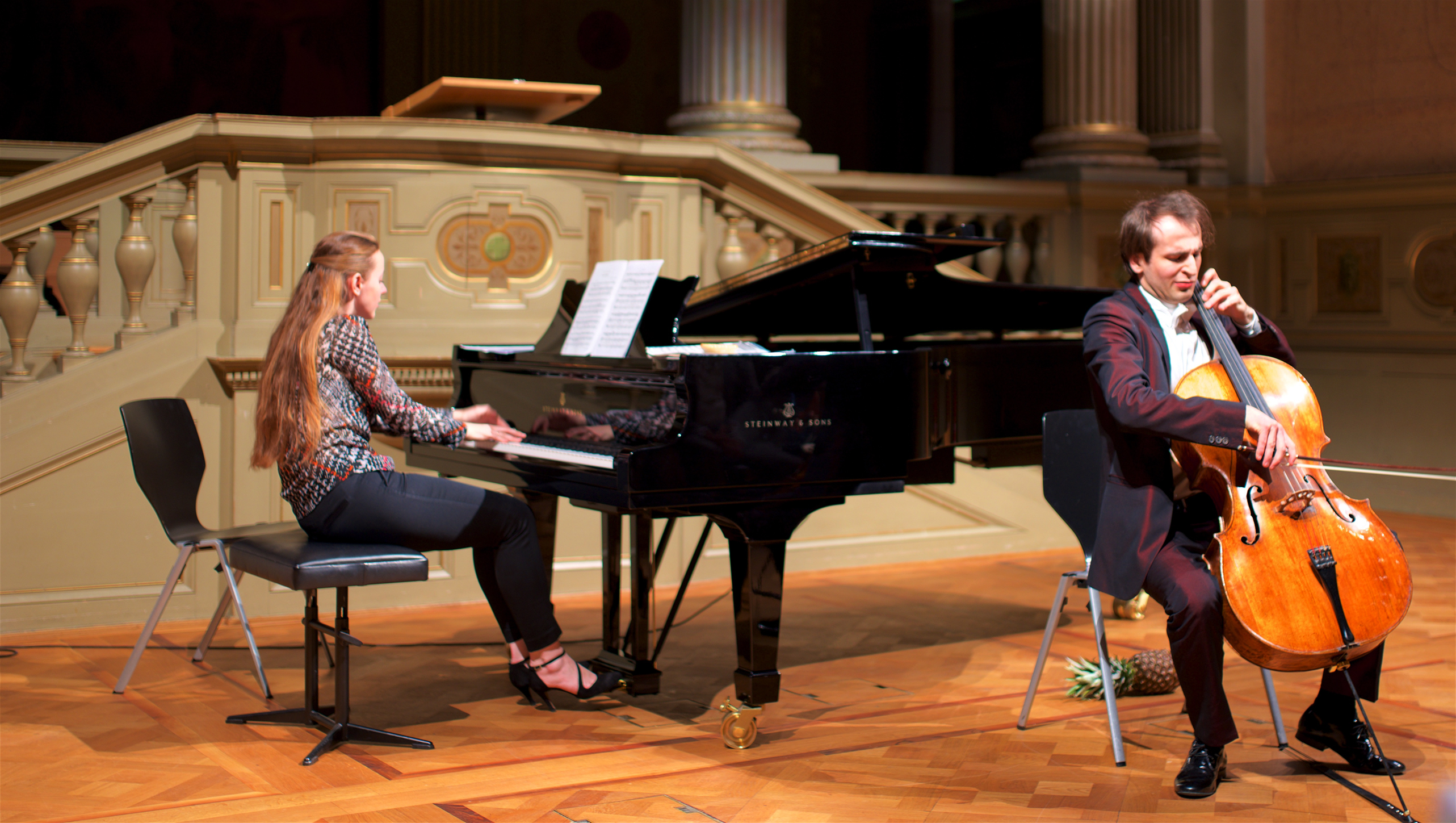Thoughts About Lay Concert Critics
Reflection & Personal Note
2017-03-31 — Original posting
2017-04-01 — Minor amendments
Table of Contents
Introduction
A note like this one was actually overdue for a while. The opportunity came with the recent duo recital by Christoph Croisé and Oxana Shevchenko in the Semper-Aula of the ETH in Zurich, on 2017-03-28. While writing up the review for that concert, I could not resist adding some personal remarks. I have now placed these in this separate blog entry.
Why this Note?
Christoph Croisé and Oxana Shevchenko stand at the (and for the) beginning of my serious efforts in the area of concert reviews. It’s true, Bachtrack invited me to write concert reviews a year before I met these artists (mid-2014). Already back then, even though I declared myself a lay critic, I did take concert reviews serious—as serious as most things that I do. And I found reviewing concerts—done “properly”, at least—a highly satisfying and rewarding task. But it’s also very demanding and time-consuming. I can’t talk of a job, as I don’t earn any money with this. It’s a task that started competing with my self-assigned blog work of comparing recordings in my music library (a hobby that some 40 years ago I once started—and soon abandoned again, back then).
Then, by mere coincidence I (virtually) met Oxana Shevchenko on Facebook. In one of the sporadic e-mails that we exchanged, she casually mentioned her upcoming concert with Christoph Croisé. So, out of my interest for Oxana’s playing, I did indeed attend that concert with the two artists at Lucerne’s Lukas Church (2015-08-27). This was Christoph Croisé’s debut recital at the Lucerne Festival. In many ways, it was a “miraculous moment” for the artists, for the audience (I think), and for myself. It instantly triggered off closer contacts with the two artists. These contacts have persisted ever since, and I have enjoyed them very much—and I still do. Moreover, this concert gave me a real boost of energy and motivation in the area of concert reviewing. It did so to such a degree that it switched the focus of my blog to this topic, almost entirely.
The Lay Critic and the Artist
At this point I should emphasize that I understand myself as a life-long music lover—but still as a layman in this area. In fact, I have studied chemistry and spend 30 years in a technical job (mostly programming, consulting and technical support). This left little time to pursue hobbies, listen to (let alone perform) music, or attending concerts. But I do listen carefully (both with my brain and my heart), I do prepare myself for concerts. And I don’t write my concert reviews light-heartedly. And I have this idea that if I tell people what makes me enjoy music, maybe it can help others to open their hearts to music, and maybe, maybe add a minuscule bit of help in opening people’s mind and making this planet a better place to live, given all the atrocities that the world is going through right now.
So, on this basis, as a layman, I could never even dream of having an effect on how music is performed. Indeed, artists to me were a group of people who (except perhaps in my early dreams) I could never aspire even approaching, get in contact with, talk to them. They might as well live on a different planet.
A Lay Critic’s Hope…
One hope that I had with my lay concert reviews is that it might possibly motivate fellow lay people to listen to music similar to the way I do. The best I could hope for: perhaps it could indicate to one or the other artist (if they ever read my—or any—reviews) how their performance and interpretations “work” on lay person such as myself. I pictured that artists may easily be trapped in their “bubble”. They may therefore not easily have access to (or a feel for) how listeners hear their music. It could well be that they don’t care, as long as they are successful. But the world of music is highly competitive. The successful ones floating near the top of the “hit lists” are a tiny minority.
Of course, there are numerous music critics. Many (most?) of them would probably call themselves “professional”—at least in that they have finished their music education with a degree or some such. Perhaps they were (or still are) artists themselves. But that may place them in a “bubble” of their own, putting them into danger of getting detached from the group of “ordinary listeners”.
The topic of music critics in general is beyond the scope of this note. At some point I might address this in a separate article.
Awareness and Responsibility
As stated above, I don’t write reviews light-heartedly. But once one starts writing in public places, such as in my blog, or for Bachtrack.com, comments are no longer casual. Needless to say that I don’t want to hurt artists with my comments. However, I have yet to meet an artist (snobs aside) who was seriously offended by my comments, even if they were rather critical. Rather, I realized that (many) artists like critical remarks—as long as they are made on a solid basis, i.e., with proper arguments and justification. This appeared to confirm my point about the artist’s “bubble”.
In fact, artists typically (or very often) know exactly (and probably better than even expert listeners) about shortcomings in their performance (and where an interpretation didn’t meet their own expectations). But they may not know how much of this is perceived by the audience. Therefore, writing about a music performance (in front of an artist, even at my modest level) may be more than bringing owls to Athens!
Yet, I don’t really mean to be more than a humble and modest servant in the area of music—a topic obviously very close to my heart. And I really mean it when I say: it’s all just my personal opinion. There is hardly such a thing as objectivity in music performance. How it works on our mind and soul is entirely subjective. I don’t mean to proclaim “absolute truth”. Critics who claim they do, aren’t—in my eyes, at least!
The Unexpected…
Back to the case in point. It touched and deeply moved me when I realized how much some artists liked (and respected) my lay reviews, even if they weren’t necessarily of the same opinion. And I was (and I still am) beyond touched to see friendly, even personal relationships with artists emerge from my activities as concert reviewer. Moreover:
In the case of the two artists in the concert that I was referring to (with Christoph Croisé and Oxana Shevchenko), it was my enthusiastic first reviews (initially just in my blog) which triggered the personal contacts. But I remained sincere to my (self-assigned) task and continued (or at least tried very hard) to write unbiased, also even critical reviews. Though, frankly, looking for points to criticize in their performances wasn’t always trivial!
Schubert / Arpeggione Sonata
In my comments to the concert in Zurich Tonhalle on 2015-11-07, I mentioned that the Allegro moderato was too slow and lost tension. When I talked to the artists after this most recent recital, Oxana stated that they listened to my comments and played the movement faster. And yes: it worked out very well!
Actually, closer inspection revealed that the tempo in reality was not faster, but somehow, they both managed to keep up the tension much better now! Tempo is relative, it seems—it may depend on the acoustics and the qualities of the instruments, the piano in particular!
Stravinsky / Suite Italienne
The first time (Schönenwerd, 2016-09-25) when I heard Christoph Croisé play the Tarantella, it was clearly too slow. In the subsequent performance in Brugg (2016-10-29) it was better, but still not close to what I regard the ideal to aim for. I mentioned Stravinsky’s own performance and recording of the music to the ballet “Pulcinella” as reference. This time, the tempo in Christoph’s performance was spot-on. Christoph mentioned that he had indeed listened to Stravinsky’s recording…
More Responsibility
I’m taking these incidents as a motivator to consider making suggestions in concert reviews even more carefully. After all, I don’t expect artists to follow my advice—at least not in a strict sense. Who am I to tell an artist how to play—I wish I could even play the piano myself! In very first priority, an artist’s interpretation should be his or her own, not somebody else’s. But of course it’s more than just OK if artists respond to suggestions in a way that a) honors the composer’s intent, and b) helps improving their performance & interpretation, hence helps furthering their career!
Thanks
The above two incidents made me feel deeply honored and grateful towards these artists: thank you so much for listening to my comments, for interacting with me. More importantly even: thank you for your friendship! The same goes to all other artists who welcomed and responded to my concert reviews, started to interact with me, even if they did not agree with my opinions. You all have changed my life for the better, you have enriched my existence!




